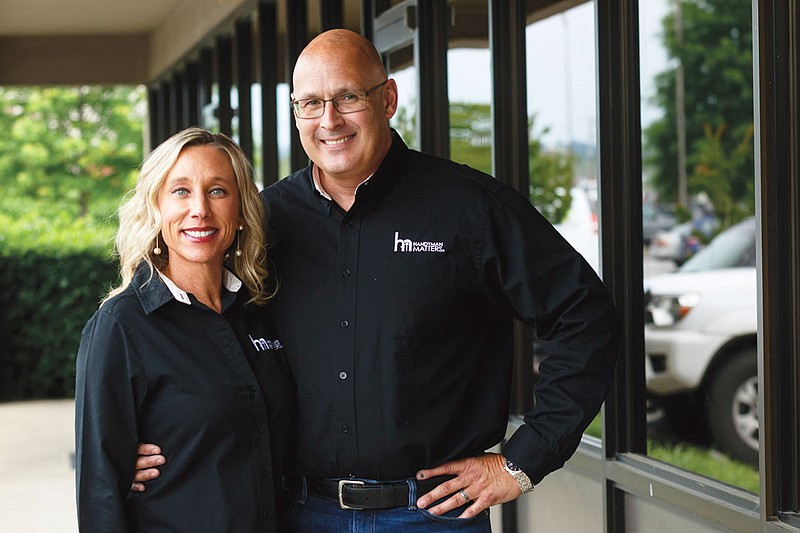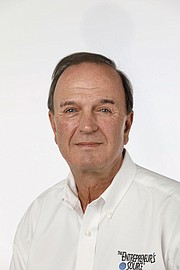Cory Sharpe worked as a journeyman lineman for the Tennessee Valley Authority and the city of Dayton, Tennessee, for 18 years before deciding he wanted to try running his own business.
Sharpe turned to business advisor Bruce Krebs at the Entrepreneurs Source for new businesses to pursue, but he admits that he wasn't initially thrilled with Krebs' pitch for what the consultant thought would be ideal venture for Sharpe - a local franchise for the Deck Medic.
"I told him I hate deck staining, and he said, 'so does most everybody else,'" Sharpe says.
So at age 39 and eager to make a change, Sharpe decided to fly to Chicago to learn more about Deck Medic, a 30-year-old business that specializes in deck staining, power washing and maintaining wooden decks and docks. Sharpe was quickly convinced of the potential for the business to succeed and bought the franchise.
"I really loved the people and the business and there was nothing like it in Chattanooga," Sharpe recalls. "Ever since I started, my biggest competitor has been the clock and the biggest challenge has been just trying to keep up with the volume of business."
Like most of the entrepreneurs Krebs works with who are starting new businesses toward the middle or end of their careers, Sharpe was aided by an SBA Express Loan, which provided him a $150,000, 10-year note to help him handle startup expenses and allow for him to pay himself while he got the business going. That allows Sharpe to not only have the working capital to get the business up and running but enough resources to also pay himself for the first year or two while the business grows.
Krebs, one of the nation's top agents for The Entrepreneurs Source, says such SBA loans are key to helping more employees become entrepreneurs and pursue franchise opportunities.
"It's been a God-send to my clients," Krebs says. "When this program began, it was a real tipping point for people going into business for themselves today."
Krebs said so far this year he has sent 78 applicants to SBA Express Loan lenders. In the past, to get a $150,000 SBA loan, borrowers had to pledge a $30,000 cash down payment - 20 percent of the loan - and pledge home equity or other assets against the loan. The signature loans, which the SBA guarantees 75 percent of for the lenders that make such loans, don't require the same level of collateral for borrowers, Krebs said.
"The biggest issue that I had in the past was getting funding for the client," he says. "The businesses I show my clients are not that expensive, but when you think of an initial franchise fee, training, corporate set up and paying yourself while you get started, that can often be a struggle for those trying to start their own business, even with the help of the franchisors."
SBA Express loans launched provides up to $150,000 loan for a new business on a signature, requiring no money down with a 10-year amortization and no early pre-payment penalty. Borrowers just need a credit score of at least 675 with no lawsuits or outstanding collections.
"Financing became much easier, and that was the major change in helping people go into business for themselves," Krebs said. "Very few people think they have enough money to go to business."
Krebs pitches franchise businesses in underserved markets where he sees both local opportunity in the market and support for those going into business.
"A lot of people want to get into their own business and do something different, but they want to find out what is out there first," he says. "Once you understand there is an alternative and you wake up in the middle of the night worried about being downsized or wanting to do something different, you know there is a plan B to where they are now working."
The Tutor Doctor
For James Meyers, a real estate industry veteran who previously helped tutor students at the University of Tennessee at Chattanooga, the SBA Express loan helped him launch the local franchise of the Tutor Doctor.
"This business really enabled me to do everything I had been doing for the success of students at UTC to the community as a whole," he says. "Last summer, I went all in with this after studying the franchise and the (SBA) loan really helped me get started."
Tutor Doctor, based in Toronto, Ontario, has been around since 2003, specializing in one-to-one counseling within the student's home across a range of subjects and ages.
"We are able to customize the tutoring we provide, which sets us a part from a lot of other services, and our tutors have really made a difference in the past year, sometimes lifting student grades in school by a whole grade or two," Meyers says. "When I was in real estate, I helped people make what is usually the biggest investment of their lives in the home they buy. Education is quickly, if not already, becoming the second biggest investment people ever make in their lives and I have been able, through my experience at the university and working with different students, to help them navigate the path of education to optimize the investment they are making."
Meyers said Krebs helped him find the best franchise for his interest, crediting the Tutor Doctor business model for helping him market and promote the new business and attract both tutors and students.
Handyman Matters
Barry Frizzell also was looking for a new business venture after a divorce pushed him out of the family-owned repair business where he previously worked and helped manage.
Krebs helped Frizzell find a competing franchise, Handyman Matters, which he launched in Chattanooga last August.
"I have worked for other people and businesses, but I enjoy being able to make my own decisions and be responsible for what I do, so I wanted to own my own business," Frizzell says.
So at age 47, he started his business and he credits the SBA loan for making it possible.
"I couldn't have done it without it," he says. "It took a good three months to put the plan and loan together, but I needed that to purchase the franchise and have the working capital to be able to pay myself and handle the initial expenses. The money I spent on the franchise fee, I feel like I would have spent re-inventing the wheel, creating a new brand, web site and identity to get business and I know that can be tedious and expensive to do. All of that is done for you when you buy a franchise."
Frizzell said his phone started ringing the day he opened his business with projects ranging from $125 up to nearly $20,000, although he acknowledges that with four other similar franchise repair businesses in Chattanooga - Andy OnCall, Handyman Connection, Mr. Handyman and Honey Do Service - it is a competitive business.
"I could use more business, but I am happy with the way it is going," he says.
Key Renter
Dana Templeton said Krebs helped her find a number of potential business opportunities with franchisers when she decided she wanted a new job a couple of years go. What Templeton liked best among the alternatives was Key Renter, a property management, leasing and maintenance service that helps landlords find and keep tenants and collects rents and handles other tasks for property owners.
"I was already doing property management and in working with landlords I saw how time-consuming property management can be and the need for this service for many real estate investors," Templeton says.
The business model helps screens potential tenants for landlords and find the best renters, as well as full property management, leasing, collections and maintenance.
"We are really good at screening tenants and trouble shooting problems at properties with a 24-hour maintenance line with representatives who can assess what, if any, immediate action is required," Templeton says.
The SBA loan "helped take a lot of the fiscal pressure off" while the business is getting going, Templeton said.
"It's great being small and local, but the franchise helps give you the knowledge and support of a larger company and a network for other people in a similar situation," she says. "That's key in getting a business going."

